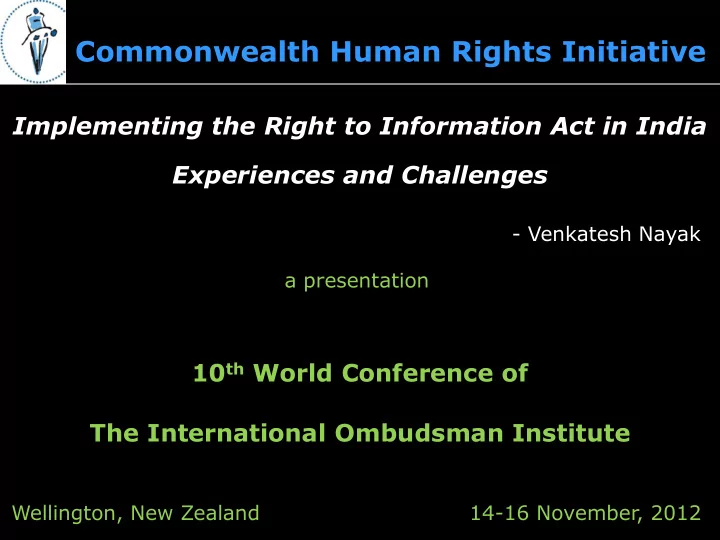

Commonwealth Human Rights Initiative Implementing the Right to Information Act in India Experiences and Challenges - Venkatesh Nayak a presentation 10 th World Conference of The International Ombudsman Institute Wellington, New Zealand 14-16 November, 2012
RTI in India – looking at the bright side first Rated second best access law in the world (Global RTI Rating) More well known than the Constitution (arguably) Between 3-6 million requests since 2005 (Literacy level - 2/3 rds ; Internet access – less than 10%) Citizen empowering tool – dialogue between governments and the people has increased (is it eco- friendly?) Petty corruption, mal-administration, poor service delivery, flaws of policy making (unearthed by the 1000s) Grievance redress, accountability seeking (countless cases)
RTI in India – looking at the bright side first Big ticket corruption unravelled (Commonwealth Games, Adarsh Housing society, irrigation, sales tax evasion scams) People, CSOs and mass media are defending the law from roll back Polity is going through a churn – people are demanding governance reform, strong anti-corruption law/agency (http://indiatoday.intoday.in) (http://indiashouts.com)
RTI in India – Challenges to implementation “Parliament alone must decide what to “Insulate my correspondence with Govt.” disclose from its records.” (President of India after signing the RTI (Committee on Privileges) Bill) “Chief Justice is not a public authority under the RTI Act.” (Chief Justice of India speaking to the media in 2010)
RTI in India – Challenges to implementation “Information about public private partnerships can be obtained without recourse to the RTI Act” - Planning Commission (PPPs have resisted transparency in collusion with nodal departments) Some anti-corruption agencies excluded from the RTI Act: Central Bureau of Investigation Tamil Nadu State Vigilance Commission Uttar Pradesh (UP) Lokayukta (Ombudsman) UP Government’s official line – “If anti-corruption bodies are exempted from the RTI Act, they can function more transparently and effectively. ”
RTI in India – Challenges to implementation Total number of public authorities in the country – not known Total number of public information officers – not known The right to know is more expensive in some States than in others – multiple RTI Rules regime, no mechanism for scrutiny at all levels 60% rejections in Central Govt. – for reasons other than exemptions Information Commissions – opaque selection process; rising levels of pendency; absence of case disposal norms; poor compliance with orders Information Commissions – fear of penalty forces information disclosure Uneven development of RTI jurisprudence – conservatism of the Apex court vis-à-vis High Courts
RTI in India – Challenges to implementation Dealing with vexatious and frivolous requests – Indian style: One subject matter and 150-500 word limits Each query is treated as a separate subject matter Outright rejection – but ICs have ordered disclosure of information- limited in volume/form of access Officers trained so far – less than 25% of the bureaucracy Records management has not improved at district and sub-district level Inadequate budgeting and poor planning Slow to take off in some States
RTI in India – Challenges to implementation Proactive disclosure – poorly done, rarely updated Central Government appointed Task Force – report delayed by more than a year But CSOs have pushed for improved proactive disclosure at district and State levels – wall paintings Malav and Limkheda Panchayats, Gujarat, India
The RTI Act – Usage Civil society actors are using RTI for increasing people’s participation in: Law-making: pre-legislative consultation Budget-making Social audit of developmental projects Civil society and activists are monitoring: Compliance of public authorities with RTI Act Performance of Information Commissions RTI is also dangerous to health and well being – 15 murders can be linked to RTI activism
India on the international scene India refused to join the Open Government Partnership claims to work with the US Govt. to improve transparency Open Data website has only test / sample datasets (www.data.gov.in) has influenced: RTI laws in Nepal, Bangladesh, Guyana and Maldives RTI Bill Some aspects of the Draft Model ATI Law for the African Union Policymakers from Africa (Rwanda, Nigeria, Liberia, Egypt) visit India to learn from its experience
For more information please contact – Commonwealth Human Rights Initiative B-117, I Floor Sarvodaya Enclave, New Delhi – 110 017 Email : venkatesh@humanrightsinitiative.org Tel : +91-11-43180201/ 43180215 Fax : 011-26864688 Website : www.humanrightsinitiative.org Thank you
Recommend
More recommend